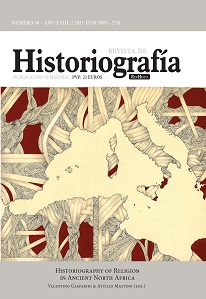Les religions antiques en Afrique du Nord d’après les sources arabes médiévales
Resumen
Bien que les informations fournies par les sources arabes médiévales concernant le passé pré-islamique de l’Afrique du Nord sont souvent fort maigres et pleines de confusions et d’amalgames, l’image qu’elles fournissent de la situation religieuse de l’Afrique du Nord au VIIe siècle n’est pas assez éloignée de celle que nous donne la documentation classique gréco-latine. Si la majorité absolue de la population africo-romaine était christianisée, le monde tribal africain était, quant à lui, partagé entre ceux qui ont adopté la religion chrétienne et ceux qui ont conservé leur polythéisme traditionnel. Au moment de leur invasion au VIIe siècle, les Musulmans ne semblent pas avoir accordé une grande importance aux attitudes religieuses des peuples conquis. La ligne de démarcation était entre ceux qui acceptent de se soumettre aux nouveaux maitres et ceux qui s’en opposent. Les tribus christianisées, liées par des traités d’alliances avec le pouvoir romain, ont brandi l’étendard de la résistance. Les tribus païennes, déjà en lutte ouverte contre le régime en place, n’avaient pas un seul mot d’ordre. Ceux qui se sont soumis, comme les Lawāta et bien d’autres, correspondent mal au cadrage juridique tardif conçu par les fuqaha du IXe siècle pour le statut des dhimmi. C’est seulement pour les y ajuster, qu’on leur appliqua l’épithète maǧūs, dénudé de toutes ces connotations primitives en rapport avec le zoroastrisme perse.
Descargas
Derechos de autor 2021 Instituto de Historiografía "Julio Caro Baroja" de la Universidad Carlos III

Esta obra está bajo licencia internacional Creative Commons Reconocimiento-NoComercial-SinObrasDerivadas 4.0.
El titular de los derechos de autor de los contenidos de esta revista es el Instituto de Historiografía "Julio Caro Baroja" de la Universidad Carlos III de Madrid.




